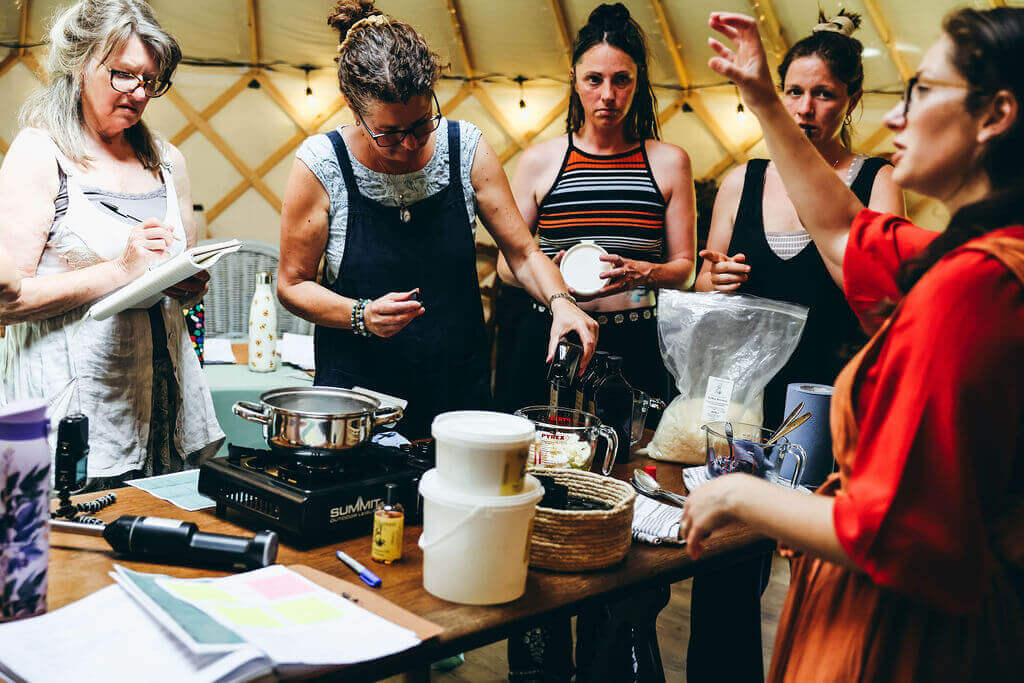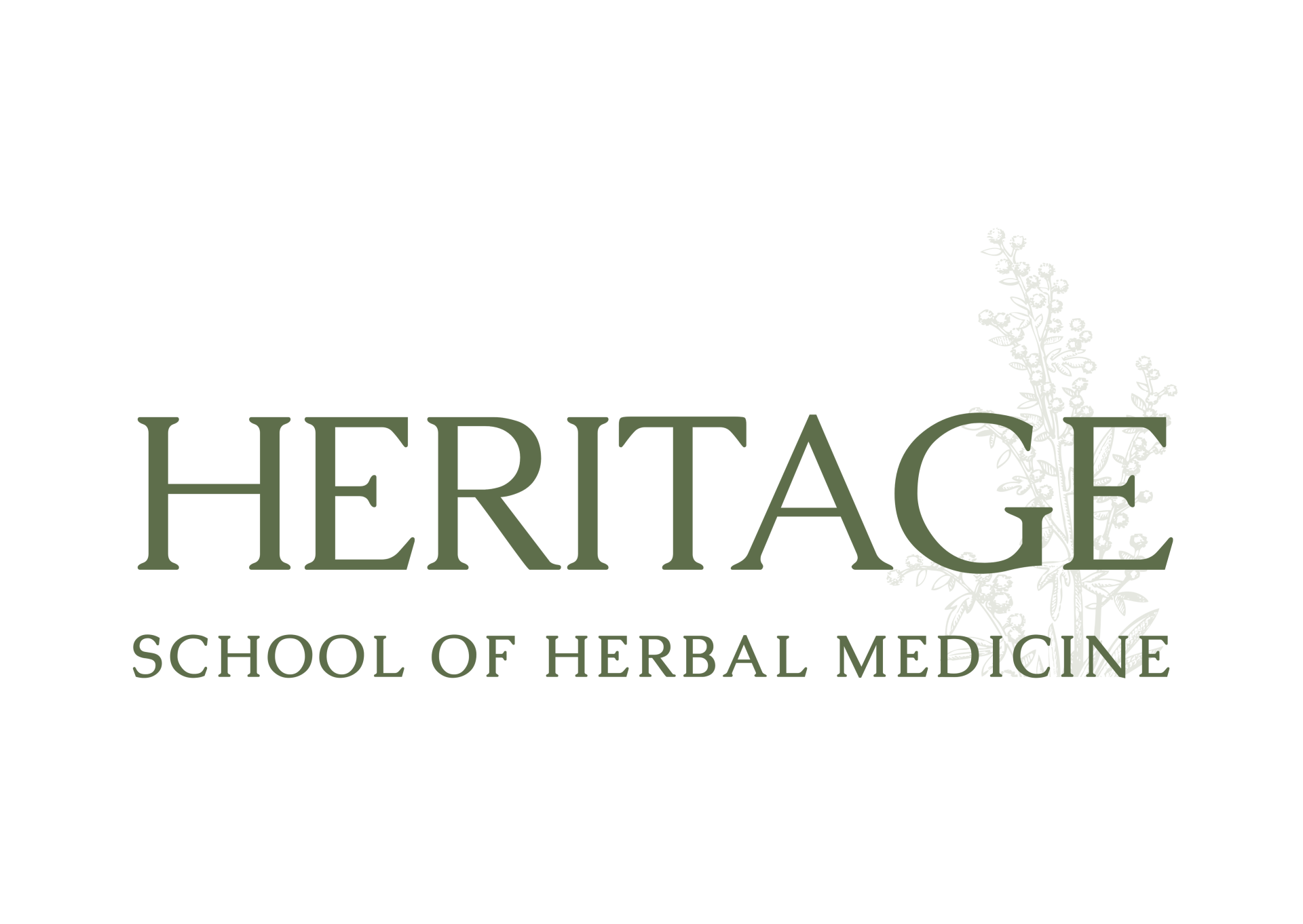What a brilliant - and sunny - suite of summer gatherings we’ve been having this year! We’ve been enjoying the sunshine and holding our sessions in the herb garden as much as possible, and it’s been glorious. Read on to find out what our first-, second- and third-year students have been up to on their herbalist training this season.

First-Year Cohorts Get Hands-On Herbalist Training
Our summer gathering is always highly anticipated by our first-year students because this is the time when we roll up our sleeves and start making herbal remedies in earnest. This is after we’ve spent the spring/summer Zoom sessions making the tea of each herb - an important form of herbal remedy - and getting to know our twelve herbal familiars one by one, so that students can fully appreciate just how versatile each of the remedies we make together in the summer is and so they know what to do with them.
Everything we do is with intention, so for each of the forms of herbal remedies our first-years made, they learned the fundamentals of how to make them, as well as important nuances, such as which herbs are best suited to which types of remedies, when to work with a salve versus a cream versus a body butter, and just what texture and colour and smell they should expect to know they’ve made a potent and effective remedy.
We took our time learning an advanced methodology of herb-infused oil making, as any other topical remedy made is only as good as the quality of the herb-infused oil at its core. Samples were passed round of the infused oil of each of our herbs so students can get a sense of the colour, smell and texture they should have.
We began an experiment to compare the folk method of tincture making to the weight to volume method using the same herb. Both tinctures will macerate over the summer and be compared in the autumn when we gather again, so students can decide which method they feel extracts the most goodness of the plant, as well as which one they’d like to continue to experiment with at home.
Amongst all the excitement of making remedies and seeing our herbal familiars at their peak in the herb garden, the best part of the summer gathering is just how social it is - how excited everyone is to see each other in person again after getting to know each other over the preceding twelve weeks. Hugs and grins abound, plants and other herbal goodies are swapped, books are browsed. Sometimes the singing bowl has to be dinged to call everyone back from their enthusiastic conversations, which is always a good sign!
And of course, nothing goes to waste. Any last scrapings of lavender cream get snaffled up and massaged into arms, legs, necks and shoulders. Any oil that drips on the apothecary table gets rubbed right in. Any herbs that have travelled across the herb garden and taken up residence in a different bed are lovingly dug up, potted up, and taken home by students.
At the end of the day, everyone goes home with a smattering of jars and bottles made together and lots of warm memories to carry them through the summer break.
Second-Year Students Tune Into the Summer Seasons
In our second-years’ herbalist training, we are focusing on attuning to the seasons, now that they’ve turned up the volume of their intuition in year one. We cast our minds back to Beltane (May Day) to explore the transitional time after the Spring Equinox, and then we got fully stuck into the energies of the Summer Solstice. Which herbs are best suited to working with at this time? Which types of remedies? Which tastes balance the shifts happening with the doshas at this point in the wheel of the year? Which foods and ways of preparing food are most aligned?
And then we discussed the pause - the observation we can perform at each season throughout the year, noticing on a daily basis where we may be finding friction in our daily or weekly rhythms and therefore, where we can identify opportunities to shift, to adjust, to change timings, to remove, to add in so that our energy can flow more smoothly in line with the season and facilitate more balance within us, ultimately supporting our health.
This cohort of second-years are very keen on books and decks, so nearly everyone brought a stack proudly piled in front of them at their seats so everyone could have a good browse over lunch. It’s always wonderful to explore new references that we may want to add to our collections, as all of our favourite herbals aren’t necessarily in many bookstores or libraries to review before we buy them. We’ll occasionally pass on a few books from our own collection to students when we know they can be more widely enjoyed, as well.
We concluded the day with our seasonal dried herb and infused oil blends, which second-years take home to either work with as is, to expand to more tailored five-herb blends based on their own needs or to transform into other forms of remedies. The cohort also got inspired during our spring/summer Zoom sessions to get a bit experimental with some new remedies, so we gave it a go with great results!
Third-Year Students Focus on Matrescence
Our third-year students are working their way through the spiral of life in their final year of our intensive course’s herbalist training and are now focusing on matrescence - the journey of becoming that is motherhood. By year three, our students have a firm grasp of how tightly herbs are woven into the rest of the threads of life that weave together to create our days, our years, our resilience. So as we explored herbs we can work with to support the time preparing for pregnancy and strengthening fertility, conception, pregnancy, birth and postpartum, we also considered what we need more of during this stage of life - nourishment, community, rest, self-assertion. It was both a stirring and moving conversation, as we had voices ranging from grandmothers, mothers of teens and young adults, as well as of young children - all of which reinforced just how much we need each other during this stage of life.
Having been together for so long, this cohort has a wonderful, supportive, tight-knit feel to it, which means there is a safe space to have some of these more challenging conversations, as well as a bit more flexibility to play within the group. This group is keen on ghee, so we found an unusual ghee-based body butter recipe to create. We’ve also made a kitchen-kit method coriander hydrosol with gorgeous results, and have a digestive oxymel macerating. And we’ve had the very special treat of one of the cohort bringing her gongs and singing bowls to treat us all to a sublime sound bath in the yurt at the end of the day.
So as we wrap up the teaching season before our summer break, when we’ll be busy harvesting, planting a few new herbs in the garden and taking a well deserved rest, as well, our students have the opportunity to rest, digest, reflect and experiment. We’ll miss each other over the summer, but will look forward to gathering again when all of nature begins to turn inwards in the autumn. (And the sharing in the WhatsApp groups carry on, despite the break!) We cannot wait to continue to walk with our students as their journeys evolve.
If you’re here in the UK, you’re very welcome to join us on our intensive herbalism course - Awaken Herbal Wisdom - which spans all four seasons. With up to three years of development available, our course gets herbalism both deep into your bones and your daily life, without either having to do a clinical degree or a traditional full-time apprenticeship. Although it is intense, it’s suitable for a wide range of herbalists, including beginners!
Be sure to join our mailing list to hear more about what the current cohorts are up to, learn some of the golden nuggets that emerge from our sessions and receive other school updates. Enrolment opens after dates are announced each spring for the following year, and places are filled on a first-come, first-served basis. If you’re ready to join us on the journey, you can request an application to join an upcoming cohort.
Whatever your next step is with learning herbal medicine, I hope you enjoy the journey!
At the Heritage School of Herbal Medicine, our practice of herbalism is rooted in the belief that we must remember, reclaim and relearn our knowledge of our bodies, our autonomy and how to work with plant medicine in order to bring control of our own health back into our families and homes for a sustainable future for ourselves and the planet. Through our intensive herbalism course, we facilitate the development of confident, empowered herbalists, attuned to the messages of their bodies and the natural world. Living the deep wisdom of herbal medicine within themselves, their homes and their communities, they uplift themselves and others, creating a stronger society organically. We do hope you'll join us on your journey!

